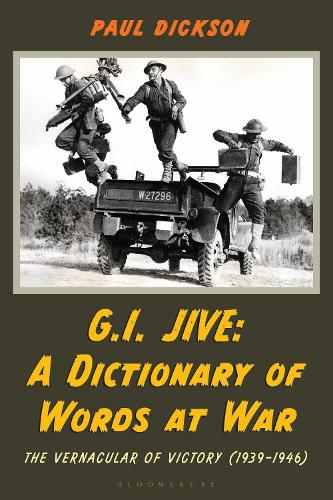
G.I. Jive: A Dictionary of Words at War: The Vernacular of Victory (1939-1946)
(Hardback)
Publishing Details
G.I. Jive: A Dictionary of Words at War: The Vernacular of Victory (1939-1946)
By (Author) Paul Dickson
Bloomsbury Publishing USA
Bloomsbury Publishing USA
30th October 2025
United States
Classifications
Professional and Scholarly
Non Fiction
Second World War
Physical Properties
Hardback
272
Width 152mm, Height 229mm
Description
The language of American World War II military service began to evolve with the first draftees of 1940. Their emerging vocabulary was irreverent, creative, and often obscene, influenced by the worlds of music, jazz, swing, jive, and the nation's fascination with occupational slang. The massive Army maneuvers in Tennessee during the spring of 1941 gave rise to a host of profane acronyms, including SNAFU, FUBAR, SOL, and others. A vibrant new American war slang took shape, bolstered by the brash slang already in use by the British Royal Air Force. G.I. Jive: A Dictionary of Words at War: The Vernacular of Victory (1939-1946) explores that language, offering a fresh and multifaceted perspective on the war and the people who fought it. Definitions are richly detailed, incorporating word histories, quotations, and examples of early usage in print. Primary sources include news accounts, memoirs, diaries, letters, oral histories, and various slang and jargon compilations published during the war.
Author Bio
Paul Dickson has written more than sixty nonfiction books on a wide variety of subjects but with a concentration on books about the American language baseball, 20th century history. His more recent narrative titles include Sputnik: The Shock of the Century, The Bonus Army: an American Epic (with Thomas B. Allen) and The Rise Of The G.I. Army 1940-1941: The Forgotten Story of How America Forged a Powerful Army Before Pearl Harbor. His previous discursive dictionaries include The Dickson Baseball Dictionary (3 editions), The Congress Dictionary (with Paul Clancy) and A Dictionary of the Space Age.
